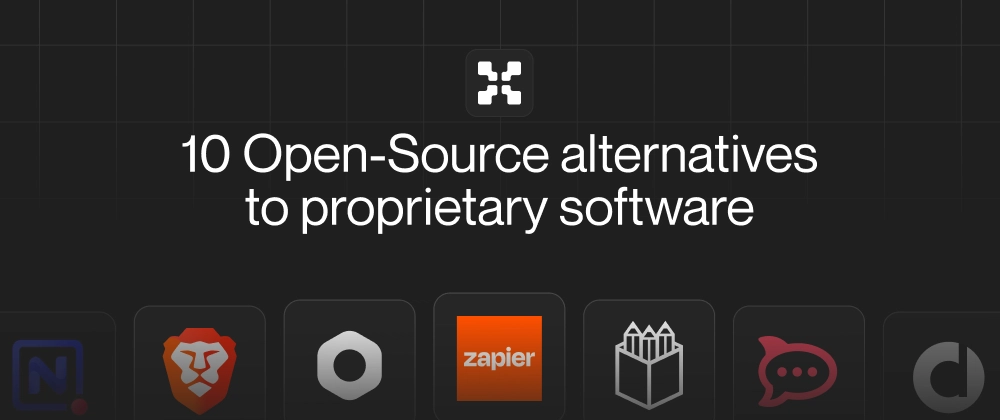In a world where software subscriptions are getting more expensive and data privacy concerns are rising, open source tools are making a huge comeback in 2025.
From graphic design and office productivity to development and video editing, there’s a powerful open-source alternative for almost every paid software out there, often completely free and community-supported.
If you’re a startup, student, freelancer, or just someone tired of paying for features you don’t use, this guide is for you.
Here are the best open-source alternatives to popular paid software you should know in 2025.
🖥️ 1. GIMP
Alternative to: Adobe Photoshop
Platform: Windows, macOS, Linux
Why it’s great:
GIMP (GNU Image Manipulation Program) is a powerful photo editing suite that rivals Photoshop. It supports layers, masks, colour grading, and even third-party plugins.
Use cases:
Photo retouching
Banner creation
Social media graphics
UI design mockups (with plug-ins)
🎨 Perfect for designers and marketers on a tight budget.
🎞️ 2. Kdenlive
Alternative to: Adobe Premiere Pro, Final Cut Pro
Platform: Windows, macOS, Linux
Why it’s great:
Kdenlive offers a professional-grade video editing experience without the licensing fee. It supports multi-track editing, transitions, effects, and 4K rendering.
Use cases:
YouTube videos
Product demos
Short films
Social media reels
🎬 A must-have for content creators looking for a free but powerful editor.
📝 3. LibreOffice
Alternative to: Microsoft Office 365
Platform: Windows, macOS, Linux
Why it’s great:
LibreOffice includes Writer (Word), Calc (Excel), Impress (PowerPoint), and more. It’s fully offline, open-source, and supports all major document formats.
Use cases:
Word processing
Data analysis
Slide creation
PDF exports
🧾 Ideal for freelancers, remote workers, and students.
💬 4. Rocket.Chat
Alternative to: Slack
Platform: Web, Desktop, Mobile
Why it’s great:
Rocket.Chat is a self-hostable team communication tool with end-to-end encryption, screen sharing, and integrations, without the user limits or subscription fees.
Use cases:
Remote team collaboration
Customer support
Developer chat rooms
Internal company comms
🔐 A smart pick for privacy-conscious startups and agencies.
📁 5. Nextcloud
Alternative to: Google Drive, Dropbox
Platform: Web, Desktop, Mobile
Why it’s great:
Nextcloud gives you full control over your cloud storage, with file sync, calendar, email, and even collaborative editing (via Collabora or OnlyOffice).
Use cases:
Secure file storage
Team collaboration
Remote file access
GDPR-compliant data handling
☁️ Best for businesses needing private cloud infrastructure.
🧠 6. Obsidian (with community plugins)
Alternative to: Notion (offline), Evernote
Platform: Windows, macOS, Linux, Mobile
Why it’s great:
Obsidian turns your notes into a knowledge graph, all stored locally. With open-source plugins, it becomes a task manager, planner, or even a second brain.
Use cases:
Zettelkasten note-taking
Personal wikis
Journaling and research
Project planning
🧩 Loved by writers, researchers, and productivity nerds.
🌐 7. Brave Browser
Alternative to: Chrome (with AdBlock), Safari
Platform: Windows, macOS, Linux, Android, iOS
Why it’s great:
Brave is a privacy-first browser with built-in ad blocking, tracker protection, and crypto rewards. Based on Chromium, it supports all Chrome extensions.
Use cases:
Secure browsing
Speed boost by blocking ads
Cryptocurrency earning (optional)
🔒 Great for anyone who values speed and data privacy.
📦 8. Bitwarden
Alternative to: 1Password, LastPass
Platform: All major platforms + browser extensions
Why it’s great:
Bitwarden is a secure password manager that’s open-source and offers cloud or self-hosted options. It supports autofill, 2FA, and sharing features.
Use cases:
Password storage
Secure team credentials
Enterprise login management
🛡️ A must-have for security-conscious teams and individuals.
🧪 9. Joplin
Alternative to: Evernote
Platform: Desktop, Mobile, Web (beta)
Why it’s great:
Joplin is a markdown-based note-taking app with end-to-end encryption and offline access. You can sync with Dropbox, Nextcloud, or even locally.
Use cases:
Note-taking
To-do lists
Journaling
Web clipping
📓 A clean, minimalist app that respects your data.
💻 10. VS Code (with open extensions)
Alternative to: JetBrains IDEs, Sublime Text
Platform: Windows, macOS, Linux
Why it’s great:
While made by Microsoft, VS Code is open source and has become the default code editor for millions. The open extensions ecosystem makes it endlessly customizable.
Use cases:
Web development
Python, JavaScript, C++, PHP, etc.
Git integration
Debugging and live preview
🧠 The best code editor for beginners and pros alike.
🧠 Bonus Tools Worth Exploring
| Open Source Tool | Paid Alternative | Use Case |
|---|---|---|
| Inkscape | Adobe Illustrator | Vector graphics and logos |
| Audacity | Adobe Audition | Audio editing and podcasting |
| Figma Linux (Penpot) | Figma | UI/UX design and collaboration |
| Draw.io / Excalidraw | Lucidchart, Miro | Flowcharts and whiteboarding |
| Zulip | Microsoft Teams | Team messaging with threading |
🚀 Final Thoughts: Open Source Is the Future
Open-source software has matured massively in recent years. What used to be clunky or developer-only tools are now polished, feature-rich, and reliable alternatives to the most popular paid apps.
By switching to open source, you:
Save money
Control your data
Support community innovation
Avoid vendor lock-in
Whether you're a solo entrepreneur, indie hacker, or scaling startup, there's never been a better time to embrace the freedom of open-source tools.












Recent Comments
No comments yet.